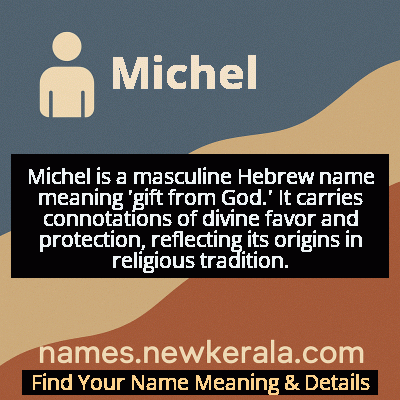Michel Name Meaning & Details
Origin, Popularity, Numerology Analysis & Name Meaning of Michel
Discover the origin, meaning, and cultural significance of the name MICHEL. Delve into its historical roots and explore the lasting impact it has had on communities and traditions.
Name
Michel
Gender
Male
Origin
Hebrew
Lucky Number
5
Meaning of the Name - Michel
Michel is a masculine Hebrew name meaning 'gift from God.' It carries connotations of divine favor and protection, reflecting its origins in religious tradition.
Michel - Complete Numerology Analysis
Your Numerology Number
Based on Pythagorean Numerology System
Ruling Planet
Mercury
Positive Nature
Adventurous, dynamic, curious, and social.
Negative Traits
Restless, impatient, inconsistent, prone to indulgence.
Lucky Colours
Green, white.
Lucky Days
Wednesday.
Lucky Stones
Emerald.
Harmony Numbers
1, 3, 9.
Best Suited Professions
Sales, marketing, travel, entertainment.
What People Like About You
Versatility, charisma, adventurous spirit.
Famous People Named Michel
Michel de Montaigne
Philosopher and Writer
Pioneered the essay as a literary form and influenced modern skepticism
Michelangelo Buonarroti
Artist and Architect
Created masterpieces like the Sistine Chapel ceiling and David sculpture
Michel Foucault
Philosopher and Historian
Revolutionized social theory with works on power, knowledge, and institutions
Michel Platini
Footballer and Administrator
Three-time Ballon d'Or winner and former UEFA President
Name Variations & International Equivalents
Click on blue names to explore their detailed meanings. Gray names with will be available soon.
Cultural & Historical Significance
In modern times, the name has maintained its cultural weight while adapting to contemporary contexts. The French form Michel became internationally recognized through cultural exports and famous individuals, creating a distinct identity separate from the English Michael. The name continues to symbolize a blend of traditional values and modern sophistication, often associated with individuals who bridge different cultural or intellectual domains. Its enduring appeal across centuries demonstrates how a name can maintain its core significance while evolving to meet changing cultural needs and preferences.
Extended Personality Analysis
Individuals named Michel are often perceived as possessing strong leadership qualities combined with intellectual depth and creative flair. They tend to be analytical thinkers who approach problems with both logic and imagination, much like the Renaissance masters who bore this name. Many Michels demonstrate a balance between practical competence and philosophical curiosity, often excelling in fields that require both technical skill and abstract thinking. There's frequently an air of quiet confidence about them, along with a protective instinct toward those they care about. Their strength often manifests not as aggression but as steadfast reliability and moral conviction.
Beyond these core traits, Michels are typically seen as individuals with strong principles and the courage to defend them. They often possess a natural authority that doesn't need to be asserted loudly, instead earning respect through consistent action and thoughtful decision-making. Many display remarkable versatility, able to move between different social contexts or professional domains with ease. There's also often a contemplative side to their personality—a tendency toward introspection that fuels both their creativity and their understanding of others. At their best, Michels embody the name's divine connotations through acts of creation, protection, and guidance, whether in artistic pursuits, intellectual endeavors, or personal relationships.
Modern Usage & Popularity
In contemporary times, Michel remains a popular name particularly in French-speaking countries, though its usage has evolved. While traditionally strong in France, Belgium, Switzerland, and Quebec, the name has seen some decline in recent decades as parents opt for more modern variations. However, it maintains a classic, sophisticated appeal and continues to be chosen by parents seeking a name with historical depth and international recognition. The name crosses cultural boundaries easily, working well in multicultural contexts. In English-speaking countries, Michel is sometimes used to honor French heritage or to provide a distinctive alternative to the more common Michael. The name's enduring popularity reflects its timeless quality and the positive associations with famous bearers across various fields, from arts and sciences to sports and business.
Symbolic & Spiritual Meanings
Symbolically, Michel represents divine protection, artistic genius, and intellectual leadership. The name carries the weight of its archangel origins, symbolizing strength in adversity and moral clarity. Like the archangel Michael who wielded a sword against darkness, the name suggests someone who confronts challenges with courage and principle. In creative contexts, it symbolizes the fusion of technical mastery and visionary imagination, embodied by figures like Michelangelo. The name also represents bridge-building between different domains—whether between heaven and earth in its religious context, or between art and science in its modern applications. As a 'gift from God,' it symbolizes both the responsibility and the privilege of using one's talents for higher purposes, making it a name that carries both weight and inspiration across cultural and historical contexts.

